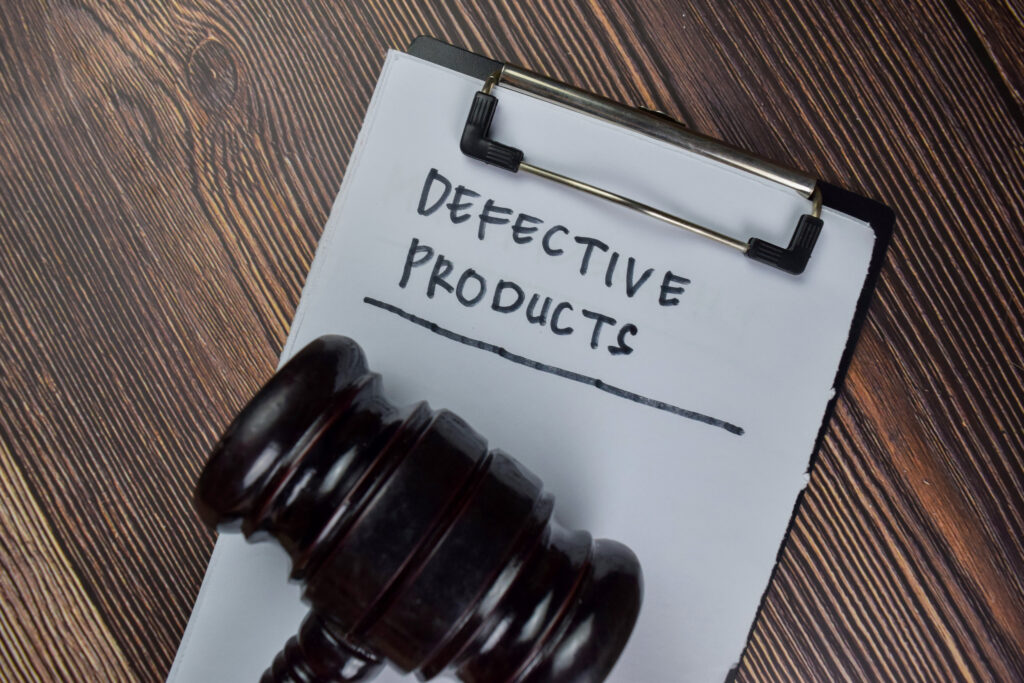Defective product lawsuits, also known as product liability lawsuits, involve legal claims made by consumers who have been injured or suffered damages due to a faulty product. These lawsuits can hold manufacturers, distributors, retailers, or other parties involved in marketing and selling a dangerous or defective product.
There can be variety of defective product incidents that need further investigation.
Poor design can make products dangerous even when properly made. Automobile parts like airbags and brakes, medical devices like pacemakers, children’s products, and construction materials can all fail due to inherent design flaws, leading to accidents and injuries.
Errors in production can cause serious issues, such as contaminated drugs, overheating electronics, malfunctioning household products, and defective food. These problems arise when products deviate from their intended design during manufacturing.
Inadequate warnings or instructions can lead to improper use and harm. This includes undisclosed drug side effects, insufficient safety warnings on household products, and unclear instructions for medical devices, all of which put consumers at risk.

Specific legal criteria must be met to have a product liability lawsuit, including:
The plaintiff must show that the product was defective, which can be a design defect, a manufacturing defect, or a marketing defect.
The plaintiff must establish a causal link between the defect and the injury or damage sustained. The plaintiff must show Actual Cause (Cause in Fact) that the injury would not have occurred “but for” the defect in the product and Proximate Cause (Legal Cause) that the injury was a foreseeable result of the defect.
The plaintiff must prove that they suffered actual harm or damages because of the defect. This can include physical injuries as well as economic and non-economic damage.
The plaintiff must demonstrate that the product was being used as intended or in a reasonable manner at the time of the injury. Misuse of a product that was not foreseeable by the manufacturer can be a defense against product liability.
The statute of limitations is the length of time you have to file a lawsuit after an injury. It can vary by state, but in Hawaii, you have two years after the date of damages sustained by the defective product to file a lawsuit. There may be some exceptions to the statute of limitations if the full extent of the injuries or damage is discovered at a later date.
In defective product cases, clients may be eligible to recover multiple types of damages, including:
This includes medical expenses, lost wages, including future earnings from a long-term or permanent disability, and property damage that results from the defective product.
This includes compensation for the physical pain and emotional suffering, and loss of enjoyment of life due to the injuries.
If a case is particularly egregious or malicious, punitive damages may be awarded to punish the defendant and deter similar behavior. These damages are less common and require proof of intentional misconduct or gross negligence.

A lawsuit cannot reverse your injuries. However, the legal process can help you find justice and heal while ensuring you are financially sound in the future. After an initial consultation, our experienced team will provide an honest assessment of whether your case has merit. If we can help, we assess all the evidence so you can receive fair compensation for the full extent of your loss.
Find quick answers to common questions about preparing for a defective product consultation.
In Hawaii, you have two years after the date of the injury, death, or property damage to file a claim. There may be some exceptions to the statute of limitations if the extent of your injuries or damage was not immediately known.
Identifying all the liable parties can be challenging. It could include the product designer, the product manufacturer, the product distributor, and/or the product retailer. An experienced personal injury lawyer can help determine who the relevant and potentially liable parties are.
Determining which type of product defect led to your injuries and what theory of liability to bring your claim under is an important part of your lawsuit and exactly why you need an experienced product liability lawyer.
If possible, you should keep the product that injured you or at least photographs of the product. This can help your legal team determine what type of defect led to your injury. If you have or can find any marketing or ads that you saw about the product, as well as instructions and warranties that came with the product, that would be helpful.